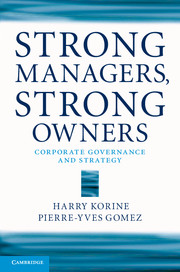Book contents
- Frontmatter
- Contents
- List of Figures
- List of Tables
- Foreword
- Acknowledgments
- Introduction
- Part I Changes in the identity of ownership and management
- Part II Changes in the form of ownership and organization
- Part III Changes in strategy
- Part IV Implications for corporate governance
- 8 The board of directors
- Conclusion
- Notes
- Index
8 - The board of directors
from Part IV - Implications for corporate governance
Published online by Cambridge University Press: 05 December 2013
- Frontmatter
- Contents
- List of Figures
- List of Tables
- Foreword
- Acknowledgments
- Introduction
- Part I Changes in the identity of ownership and management
- Part II Changes in the form of ownership and organization
- Part III Changes in strategy
- Part IV Implications for corporate governance
- 8 The board of directors
- Conclusion
- Notes
- Index
Summary
“Corporate governance and strategy” is the subtitle of this book, but the first seven chapters do not contain a single section dedicated to the institution of the board of directors. This is not because we think the board is unimportant in the corporate governance of the firm. Our view is that the board of directors cannot be understood as an independent body, without reference to shareholders and managers. This is why we did not tackle the question of the board until the different characteristics of shareholders and managers and the critical aspects of corporate and business strategy – in failure and in success – had been described and discussed.
As an institution, the board of directors has in recent years been both reified and vilified. On the one hand, the board, and, in particular, the positions of chairperson and independent director have been at the heart of efforts to improve corporate governance. Since the 1992 Cadbury Report, if not earlier, reformers have stressed the importance of independence on the board and put much of their hope for better corporate governance on boards taking a more active role in shaping strategy and monitoring management. At the same time, the actual performance of the board of directors has been continuously criticized. The full-page picture advertisement of a silhouette of the board of directors of Sears Roebuck, with the tagline the “non-performing assets of Sears,” taken out in the Wall Street Journal in April 1992 by activist investor Robert Monks, is symptomatic of this attitude, widespread among shareholders and the general public. What is the real status of the board – supreme body of the corporation with ultimate responsibility or mere decoration, with little to say to managers or shareholders?
- Type
- Chapter
- Information
- Strong Managers, Strong OwnersCorporate Governance and Strategy, pp. 157 - 167Publisher: Cambridge University PressPrint publication year: 2013



